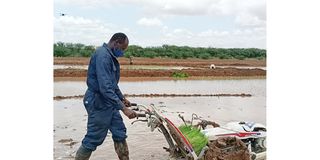Premium
Rice planter machines to cut costs of production for Bura farmers

Harun Kimathi, KiliMol plant operator demonstrates the use of a transplantor at the Bura Irrigation Scheme, Tana River County.
New rice planter machines have debuted on farms in Tana River County and farmers are thrilled.
The work of manually preparing land and transplanting seedlings from nurseries to the paddy fields is tedious, leading to average yields.
But with the introduction of transplant machines, farmers are upbeat about achieving better yields, translating to higher incomes.
Rice farmer Simon Mwangi says he pays a labourer Sh13,000 to plant an acre of paddy rice.
The wage is an increase from Sh6,500 that labourers used to charge before farmers increased farm acreage.
The labourer takes six to eight hours to plant one acre and a lot of time is wasted and seedlings die in the process.
"It's tedious and expensive for a farmer like me who wants to do seven acres or another who wants to do 10 acres," he says.

Farmers load rice seedlings on a transplantor machine at the Hola Irrigation Scheme.
Unlike labourers, machines plant an acre and a half in thirty minutes.
The machine also cuts the cost of labour from Sh13,000 to Sh3,000 per acre, a win for farmers.
Natasha Mwania, a rice farmer in Bura, notes that the machines have come at the right time.
To make the county the country's food basket, she says, farm activities must be mechanised.
"We are in that stage where a single farmer is farming seven acres. That is an indication that we are expanding and manual labour should be a thing of the past," she says.
The farmer notes that, unlike before when Tana River farmers used to harvest 50 bags of rice that was consumed locally, the new era is witnessing farmers harvesting more than 400 bags of rice and over 800 bags of maize.
She says manual labourers are overwhelmed, and most of them have built up their capacity.
"There used to be more casual labourers than farmers, but currently it is becoming difficult to get a labourer in the season. They are few and all engaged throughout the season," she notes.
The introduction of planters, she says, will make production easier and thus bolstering the local economy.
However, she is concerned about the cost of the machines, noting that farmers cannot afford most of them.
She appeals to the county’s department of agriculture to acquire some of the machines and lease them to farmers.
"Just like they have supplied us with tractors that have improved productivity at a low cost, they will do us a great favour if they acquire for us more of these machines," she says.
Harun Kimathi, an operator with KiliMol, a Japanese company that deals in farm machinery, notes that small-scale farmers have a chance to revolutionise farming in counties and match up to what large-scale farmers are doing.
A rice transplanter machine that sells for Sh250,000, he says, saves the small-scale farmer more than Sh30,000 per acre.
"It is an opportunity to make farms a one-stop shop, where they can harvest on the same farm, thresh on the same spot and transport finished products to the market," he says.
The revolution in the agro-economy, Mr Kimathi says, has spiralled beyond human labour as the market demands quality.
He notes that human labour affects quality by 70 percent and is 89 percent behind time and hence unreliable.
"These machines are pocket-friendly. The highest price we have for a machine is Sh3.1 million and the least goes for Sh100,000. It is something farmers can afford," he says.
Bura Irrigation Scheme Manager Peter Orwa notes that the scheme is expanding rapidly, with rice farming drawing more investors.
He advises farmers in Tana River to get into groups, enrol in saccos or form cooperatives to acquire the machines.
"There is a huge potential here. The moment to change production in this county is here and only farmers can take it to the next level," he says.
Mr Orwa also calls upon the county administration to take the challenge and procure the machines for use in both major and minor irrigation schemes in the county.
Meanwhile, Tana River County Secretary Joshua Jarha says that county officials are thinking about this issue.
He says the administration embraces farm mechanisation and is ready to work with like-minded people.
"We have engaged several stakeholders and I'm glad that KiliMol is coming up with some answers. We are open to proposals as food security is our main agenda," he says.
Tana River boasts three major irrigation schemes and 14 minor ones.
With more than 80,000 acres for commercial agriculture, more than 10,000 acres are under rice production.





